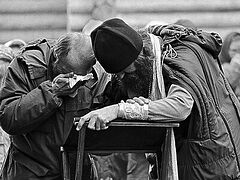 Bell ringer by artist Sergey Troshin
Bell ringer by artist Sergey Troshin
By the grace of God we have, brethren, finished another Holy Lent. Much has been acquired by those who spent it as they ought, but likewise, it’s no small loss for those who didn’t spend it as they ought. The Church doesn’t force anyone to fulfill the statutes, but those who don’t, punish themselves. When those who have labored well in fasting now enter into the joy of their Lord, the weak and disobedient sons of the Church must necessarily feel some deprivation and sorrow. It’s good if God allows them to live again until another Lent to correct the present omission (although it’s no longer possible to fully get back what was lost); and for whoever doesn’t receive this mercy from God, Great Lent is lost forever. What prevented you from being obedient, from sowing together with the others so you could now reap with the others? When we labor, it’s always more or less difficult, but all the more pleasant when it’s over. I think this day is very joyful for those who have labored throughout Holy Lent. May such people fall down in humility before the face of the altar of the Lord, and may they thank the Lord for this! Without His grace, brethren, you not only wouldn’t finish, but wouldn’t even have begun this holy feat.
But, rejoicing at the end of this feat, we mustn’t rejoice like a prisoner leaving prison; this would mean not knowing the value and sweetness of fasting. Whoever has known them won’t part with fasting even at the end of Lent. And how could we part? Is it possible to give up the inner fast, consisting in abstention from the passions, without destruction for the soul? The end of this fast would be the end of our virtue. This set time exists for abstinence from foods, not from sins. But it’s also bad to limit restraint in foods to any one time. Any food that is harmful for the soul is forbidden at any time, and whoever eats it to the detriment of his soul, whenever he eats it, violates the ordinances of fasting. Thus, it’s not necessary to part with bodily fasting entirely, as many do. Completely giving up fasting would be a sign that you didn’t love fasting; for is it possible to give up something you loved heartily for a long time? And is it possible not to love heartily that which healed your soul? If you completely give up fasting, it shows that you fasted out of necessity, and not out of conviction; you wore the bonds as a slave and prisoner.
Experience should have shown you that fasting is a constant forerunner and companion of prayer, the father of pious reflections, the educator of good enterprises, the support of difficult feats of faith and love. Therefore, immediately call upon it in all such cases. For such is the property of good, proven treatments—that they are turned to at the first need. And best of all is if you make fasting your companion throughout your entire life. Don’t be horrified by this advice. Fulfilling it won’t make your life boring or difficult, as it might seem to you, but to the contrary, it will relieve you from many evils, sorrows, and woes. You yourself will agree once you realize what constant fasting consists of: It’s not about not eating food, but about eating in such a manner that you never please the flesh, so you arise from the table every time with some remaining hunger, not with satiety, as usually happens. Is this podvig difficult? Don’t doctors also advise this? And doesn’t this bring the promise of a healthy body? But we promise you a healthy soul for it. For it must be admitted and confessed that the soul suffers from nothing so much as from the body, and the body suffers from nothing so much as from an excess of food and drink.
What I have said about fasting should also be said of repentance and confession. We shouldn’t part from them either at the end of the Fast. If we would sin and fall at one specific time, then we could postpone repentance until that certain time, but we sin at various times; and when we sin, then we must repent and confess. Do we wait until a wound becomes infected? Rather, as soon as we’re wounded, we immediately try to heal it. We should act the same way with spiritual wounds, with sin. Thus, the spiritual hospital is always open, so it would always be possible to come to it for healing. If a bodily wound can’t be ignored for a long time without posing a threat, then all the more so a spiritual wound. We think nothing of bearing a wound in the soul for a long time, but this is a wretched deception! Sin is a terrible poison. If you don’t stop its action by speedy repentance, then it penetrates the entire soul and infects it for a long time. This is why we become pitiful slaves of the passions—because we didn’t suppress them at the very beginning. After that, we repent and see our slavery, but often we’re no longer able to break the bonds.
As for communing of the Holy Mysteries, I don’t know how a true Christian could deprive himself of this Divine food all year. This deprivation alone already shows that they don’t know the value of the Body and Blood of the Lord, and such ignorance is equal to the ignorance of their salvation. Ancient Christians didn’t act this way: They communed every time the Liturgy was celebrated, which is recalled with the invocation repeated now at every Liturgy: “With the fear of God and faith draw near!” This invocation shows that all those present at the Liturgy should also approach Communion.
The awareness of impurity and unworthiness and the desire to better prepare for this great Mystery led to the practice of communing not always, but only on certain days and times. But this custom must not serve as a support for our laziness. What if it were said that manna will be distributed daily in such and such a place? I think a multitude of people would appear every day to receive some; and if it demanded some kind of preparation, then many would prepare for it every day. But the Church daily offers the Body and Blood of the Lord, and no one comes to receive them! Is this a good sign? Is it healthy for a soul to turn away from spiritual food? Perhaps some didn’t have time to prepare. But if no one comes forth to receive the Heavenly Bread, it means everyone is unworthy; and if everyone is unworthy, then what can be said of our Christianity? What would the king say about a courtier who, being invited to the table every day, would come only once a year?
Thus, brethren, in parting with the Holy Forty Days, we mustn’t part with those means of salvation that it consists of. The Church concentrates them all together at one time due to our weakness and distractedness at other times. It directs us to use these means under its special supervision, so that even the most inexperienced would use them as they ought, not to render them unused throughout the rest of the year. If, however, at other times you need the call and oversight of the Church, there is no scarcity of it. The Church doesn’t have just one fast, but four. Each of them can be great if you don’t diminish them by your intemperance; each will be followed by the brightest day of the Resurrection if you rise from your sins through repentance.
This is the counsel that I, brethren, felt it my duty to convey to you now at the end of the Holy Forty Days. Don’t forget, beloved, that our entire life on Earth should be Lent for us. Without this, we won’t attain to Pascha “in the unending Day of the Kingdom” (Paschal Canon, Ode 9); we won’t enter into the joy of the Resurrection.
What can I tell those who spent the Holy Forty Days without paying any attention to them and didn’t use them to heal the wounds of your conscience at all? Undoubtedly, you feel some languishing now from having not fulfilled the ordinances of the Church; it’s most likely that you didn’t fulfill them, by no means out of contempt for the authority of the Church (can children have contempt for a mother who cares for their eternal blessedness?), but rather because your sensuality has seized you. It drowned out your hearing, not allowing you to take those holy paths the Church wanted to lead us down. Sensuality, and the devil—for where this is intemperance, there is that enemy of God and virtue; he is a murderer, invisibly holding you captive, and is now, undoubtedly, rejoicing and laughing at you as at his prey.
But, brethren, do you really want to be the devil’s constant laughing stock? Enough of him abusing you; it’s time to abuse him! It’s time, I say; for he is never so weak as in these days of the Lord’s suffering and death. Now is the most convenient time for those caught alive in his snare to do his will (2 Tim. 2:26) to rise up out of his nets. And you will arise if, putting aside stubbornness and bitterness, you make haste to the spiritual hospital; if, according to the example of St. Peter, you begin to weep bitterly over your sins. He betrayed the Teacher, and yet, for his repentance, was among the first to see Him after the Resurrection. The same will happen with you if you turn to the Lord like this Apostle!
Amen.



